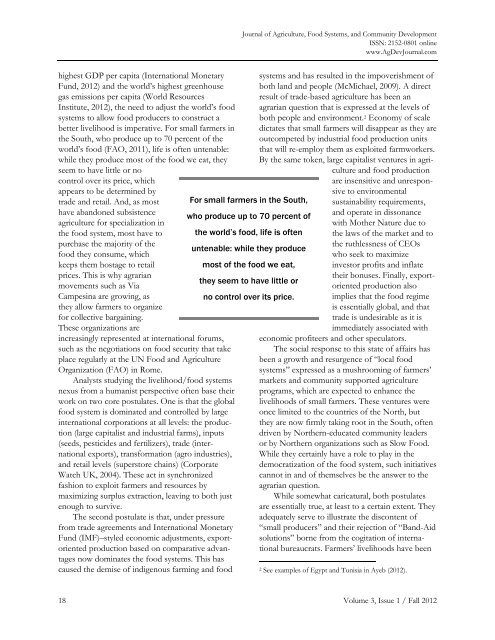Journal of Agriculture, Food Systems, and Community Development
Journal of Agriculture, Food Systems, and Community Development
Journal of Agriculture, Food Systems, and Community Development
Create successful ePaper yourself
Turn your PDF publications into a flip-book with our unique Google optimized e-Paper software.
<strong>Journal</strong> <strong>of</strong> <strong>Agriculture</strong>, <strong>Food</strong> <strong>Systems</strong>, <strong>and</strong> <strong>Community</strong> <strong>Development</strong><br />
ISSN: 2152-0801 online<br />
www.AgDev<strong>Journal</strong>.com<br />
highest GDP per capita (International Monetary<br />
Fund, 2012) <strong>and</strong> the world’s highest greenhouse<br />
gas emissions per capita (World Resources<br />
Institute, 2012), the need to adjust the world’s food<br />
systems to allow food producers to construct a<br />
better livelihood is imperative. For small farmers in<br />
the South, who produce up to 70 percent <strong>of</strong> the<br />
world’s food (FAO, 2011), life is <strong>of</strong>ten untenable:<br />
while they produce most <strong>of</strong> the food we eat, they<br />
seem to have little or no<br />
control over its price, which<br />
appears to be determined by<br />
trade <strong>and</strong> retail. And, as most<br />
have ab<strong>and</strong>oned subsistence<br />
agriculture for specialization in<br />
the food system, most have to<br />
purchase the majority <strong>of</strong> the<br />
food they consume, which<br />
keeps them hostage to retail<br />
prices. This is why agrarian<br />
movements such as Via<br />
Campesina are growing, as<br />
they allow farmers to organize<br />
for collective bargaining.<br />
These organizations are<br />
increasingly represented at international forums,<br />
such as the negotiations on food security that take<br />
place regularly at the UN <strong>Food</strong> <strong>and</strong> <strong>Agriculture</strong><br />
Organization (FAO) in Rome.<br />
Analysts studying the livelihood/food systems<br />
nexus from a humanist perspective <strong>of</strong>ten base their<br />
work on two core postulates. One is that the global<br />
food system is dominated <strong>and</strong> controlled by large<br />
international corporations at all levels: the production<br />
(large capitalist <strong>and</strong> industrial farms), inputs<br />
(seeds, pesticides <strong>and</strong> fertilizers), trade (international<br />
exports), transformation (agro industries),<br />
<strong>and</strong> retail levels (superstore chains) (Corporate<br />
Watch UK, 2004). These act in synchronized<br />
fashion to exploit farmers <strong>and</strong> resources by<br />
maximizing surplus extraction, leaving to both just<br />
enough to survive.<br />
The second postulate is that, under pressure<br />
from trade agreements <strong>and</strong> International Monetary<br />
Fund (IMF)–styled economic adjustments, exportoriented<br />
production based on comparative advantages<br />
now dominates the food systems. This has<br />
caused the demise <strong>of</strong> indigenous farming <strong>and</strong> food<br />
For small farmers in the South,<br />
who produce up to 70 percent <strong>of</strong><br />
the world’s food, life is <strong>of</strong>ten<br />
untenable: while they produce<br />
most <strong>of</strong> the food we eat,<br />
they seem to have little or<br />
no control over its price.<br />
systems <strong>and</strong> has resulted in the impoverishment <strong>of</strong><br />
both l<strong>and</strong> <strong>and</strong> people (McMichael, 2009). A direct<br />
result <strong>of</strong> trade-based agriculture has been an<br />
agrarian question that is expressed at the levels <strong>of</strong><br />
both people <strong>and</strong> environment. 2 Economy <strong>of</strong> scale<br />
dictates that small farmers will disappear as they are<br />
outcompeted by industrial food production units<br />
that will re-employ them as exploited farmworkers.<br />
By the same token, large capitalist ventures in agriculture<br />
<strong>and</strong> food production<br />
are insensitive <strong>and</strong> unresponsive<br />
to environmental<br />
sustainability requirements,<br />
<strong>and</strong> operate in dissonance<br />
with Mother Nature due to<br />
the laws <strong>of</strong> the market <strong>and</strong> to<br />
the ruthlessness <strong>of</strong> CEOs<br />
who seek to maximize<br />
investor pr<strong>of</strong>its <strong>and</strong> inflate<br />
their bonuses. Finally, exportoriented<br />
production also<br />
implies that the food regime<br />
is essentially global, <strong>and</strong> that<br />
trade is undesirable as it is<br />
immediately associated with<br />
economic pr<strong>of</strong>iteers <strong>and</strong> other speculators.<br />
The social response to this state <strong>of</strong> affairs has<br />
been a growth <strong>and</strong> resurgence <strong>of</strong> “local food<br />
systems” expressed as a mushrooming <strong>of</strong> farmers’<br />
markets <strong>and</strong> community supported agriculture<br />
programs, which are expected to enhance the<br />
livelihoods <strong>of</strong> small farmers. These ventures were<br />
once limited to the countries <strong>of</strong> the North, but<br />
they are now firmly taking root in the South, <strong>of</strong>ten<br />
driven by Northern-educated community leaders<br />
or by Northern organizations such as Slow <strong>Food</strong>.<br />
While they certainly have a role to play in the<br />
democratization <strong>of</strong> the food system, such initiatives<br />
cannot in <strong>and</strong> <strong>of</strong> themselves be the answer to the<br />
agrarian question.<br />
While somewhat caricatural, both postulates<br />
are essentially true, at least to a certain extent. They<br />
adequately serve to illustrate the discontent <strong>of</strong><br />
“small producers” <strong>and</strong> their rejection <strong>of</strong> “B<strong>and</strong>-Aid<br />
solutions” borne from the cogitation <strong>of</strong> international<br />
bureaucrats. Farmers’ livelihoods have been<br />
2 See examples <strong>of</strong> Egypt <strong>and</strong> Tunisia in Ayeb (2012).<br />
18 Volume 3, Issue 1 / Fall 2012






